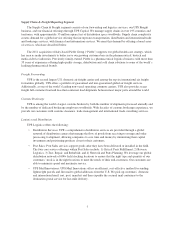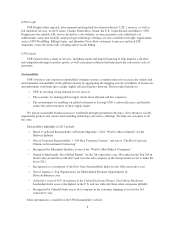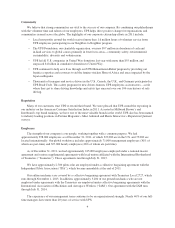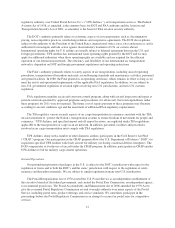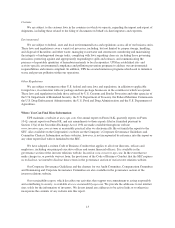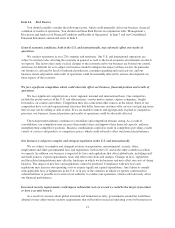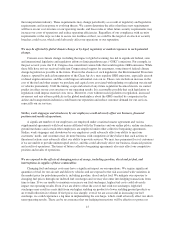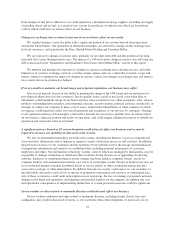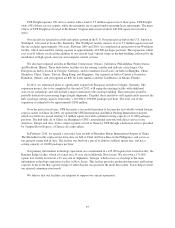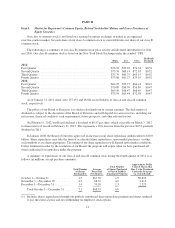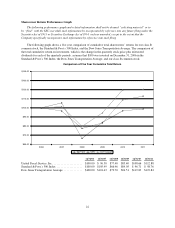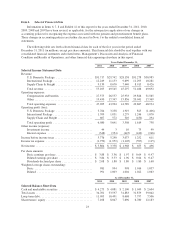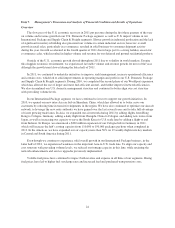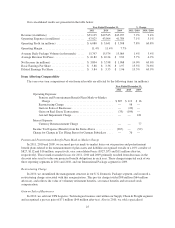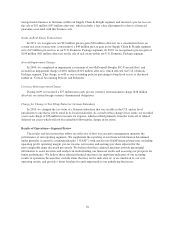UPS 2011 Annual Report Download - page 28
Download and view the complete annual report
Please find page 28 of the 2011 UPS annual report below. You can navigate through the pages in the report by either clicking on the pages listed below, or by using the keyword search tool below to find specific information within the annual report.from changes in fuel prices. Moreover, we could experience a disruption in energy supplies, including our supply
of gasoline, diesel and jet fuel, as a result of war, actions by producers, or other factors which are beyond our
control, which could have an adverse effect on our business.
Changes in exchange rates or interest rates may have an adverse effect on our results.
We conduct business across the globe with a significant portion of our revenue derived from operations
outside the United States. Our operations in international markets are affected by changes in the exchange rates
for local currencies, and in particular the Euro, British Pound Sterling and Canadian Dollar.
We are exposed to changes in interest rates, primarily on our short-term debt and that portion of our long-
term debt that carries floating interest rates. The impact of a 100-basis-point change in interest rates affecting our
debt is discussed in the “Quantitative and Qualitative Disclosures about Market Risk” section of this report.
We monitor and manage our exposures to changes in currency exchange rates and interest rates, and make
limited use of currency exchange contracts, over the counter option contracts, commodity forwards, swaps and
futures contracts to mitigate the impact of changes in currency values, but changes in exchange rates and interest
rates cannot always be predicted or hedged.
If we are unable to maintain our brand image and corporate reputation, our business may suffer.
Our success depends in part on our ability to maintain the image of the UPS brand and our reputation for
providing excellent service to our customers. Service quality issues, actual or perceived, even when false or
unfounded, could tarnish the image of our brand and may cause customers to use other companies. Also, adverse
publicity surrounding labor relations, environmental concerns, security matters, political activities and the like, or
attempts to connect our company to these sorts of issues, either in the United States or other countries in which
we operate, could negatively affect our overall reputation and acceptance of our services by customers. Damage
to our reputation and loss of brand equity could reduce demand for our services and thus have an adverse effect
on our business, financial position and results of operations, and could require additional resources to rebuild our
reputation and restore the value of our brand.
A significant privacy breach or IT system disruption could adversely affect our business and we may be
required to increase our spending on data and system security.
We rely on information technology networks and systems, including the Internet, to process, transmit and
store electronic information, and to manage or support a variety of business processes and activities. In addition,
the provision of service to our customers and the operation of our network involve the storage and transmission
of proprietary information and sensitive or confidential data, including personal information of customers,
employees and others. Our information technology systems, some of which are managed by third-parties, may be
susceptible to damage, disruptions or shutdowns due to failures during the process of upgrading or replacing
software, databases or components thereof, power outages, hardware failures, computer viruses, attacks by
computer hackers, telecommunication failures, user errors or catastrophic events. Groups of hackers may also act
in a coordinated manner to launch distributed denial of service attacks or other coordinated attacks that may
cause service outages or other interruptions. In addition, breaches in security could expose us, our customers or
the individuals affected to a risk of loss or misuse of proprietary information and sensitive or confidential data.
Any of these occurrences could result in disruptions in our operations, the loss of existing or potential customers,
damage to our brand and reputation, and litigation and potential liability for the company. In addition, the cost
and operational consequences of implementing further data or system protection measures could be significant.
Severe weather or other natural or manmade disasters could adversely affect our business.
Severe weather conditions and other natural or manmade disasters, including storms, floods, fires and
earthquakes, may result in decreased revenues, as our customers reduce their shipments, or increased costs to
16



